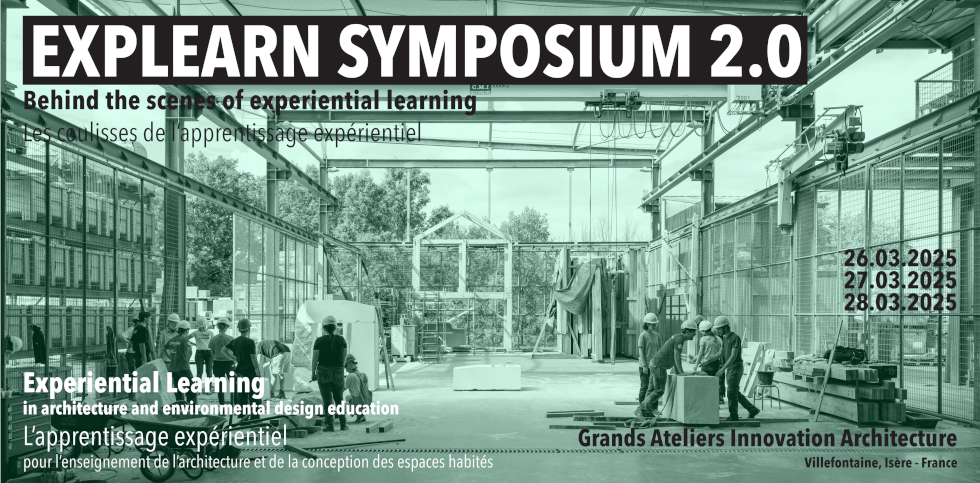
|
Introduction Designed as a festival, the organization of this innovative symposium marks the launch of the ExpLearn network recently accredited by the French Ministry of Culture. Its ambition is to bring together educators, reasearchers, and research institutions from French, European and international schools of architecture and landscape design, who are sensitive to learning by doing and experiential learning in the field of eco-responsible architecture and landscape, the art of building with biosourced and geosourced materials, and the holistic perception of space and the natural and built environment.
Programme du Symposium Programme Complet disponible en cliquant sur l'image c-idessous. Goals of the symposium The ExpLearn 2.0 international symposium is the continuation of the previous ExpLearn 1.0 symposium, which took place in Fall 2016. This, then first, scientific meeting in France on this topic allowed the documentation of various pedagogical and methodological approaches of experimental learning, and the promotion of these pedagogies, which were not widespread in France at the time. Today, we are witnessing the emergence of experiential practices in response to contemporary issues linked to ecological and societal transitions, climate change and the associated risks, respect for and enhancement of cultural diversity, and the fight against poverty. In fact, a growing number of educators trained in these practices are helping to strengthen existing courses or are keen to develop new ones in response to strong student demand, in France and on all continents. In this context, ExpLearn 2.0 sets new goals aiming to deepen the knowledge on experiential learning and the diversity of its implementations in architecture and environmental design education :
To that end, three main topics have been selected :
Contributions will describe the pedagogies and their goals for students, covering as many practices as possible, from the simplest workshops to the most elaborate design-builds. The discussion will be focused on the definition of these goals depending on the target audience, its background, or the contemplated type of projects, etc, as well as the adequacy of the methods with these goals.
Contributions will to tackle issues such as calendar, transportation, housing, implementation of materials, supervision of learners, relationships to craftspeople, to other professionals, to contractors or to local inhabitants, etc. Contributions are also expected to describe the legal framework and insurance provided specifically for these activities, as well as the academic framework that support them. An accurate definition of these aspects are getting always more necessary, even though they are strongly dependent on locations and conditions. A measure of the necessary institutional support will be at the forefront of the topic.
The impact of the undertaken pedagogies is not limited simply to the academic framework. To that extent, the symposium will also question the effects of the experiential pedagogies on the professional practice of the former learners within society, and the evaluation of its impact compared to more traditional pedagogies. Other expected communications will set in the forefront the rationale of the experiential pedagogies, as well as the tools allowing to grasp efficiently their impact on the training and the future activity of the learners.
Far beyond stereotypes associated to these experiences when experimented and shared, the EXPLEARN 2.0 international symposium will question the "why", the "how-to", and the value - both material and immaterial - of experiential learning in architecture. The symposium will allow attendees to share their respective experiences, the less-experienced educators to get to know first elements of methods and tools to start efficiently and comfortably, and to define the preliminary conditions that are necessary to implement such model approaches, in France and around the world.
Symposium program The symposium will take place over three days. The first two and a half days will be devoted to communications and discussions, followed by an optional half-day of fieldtrips, enabling participants to visit iconic experiential learning sites and projects in the french Auvergne-Rhône-Alpes region. After an introduction and a description of the ambitions for the symposium, the program will be structured around five types of communication on three topics : pedagogical approaches, organization and frameworks, societal impact.
Modalities : by invitation of the scientific committee, lecture and 5000-word paper
Modalities : by invitation of the scientific committee, oral presentation and 3000-word paper
Modalities : call for abstracts, oral presentation and 1500-word paper
Modalities : call for abstracts, interractive presentation and 1500-word paper
Modalities : call for abstracts, free format, and a 500-word article.
The symposium will be committed to document, through all contributions, the tools, research attempts, action possibilities and methods to create favorable conditions to the dissemination and democratization of experiential learning in architecture. To that extent, both the invited and selected speakers will have the possibility to revise their contribution after the symposium, in order to pave the way for a publications of the proceedings by the end of 2025.
Organizers
Supported by
This work has benefited from a French government grant, managed by the National Agency for Research under the "France 2030" program (reference ANR-22-CMAS-0017) |



